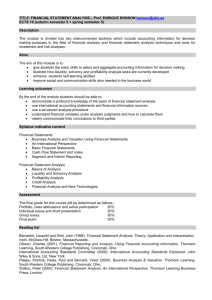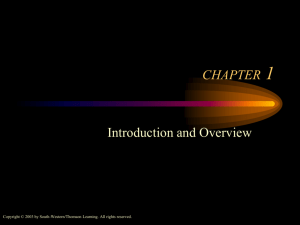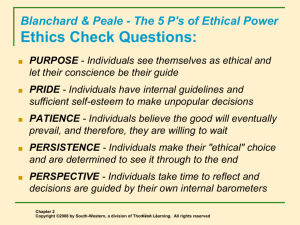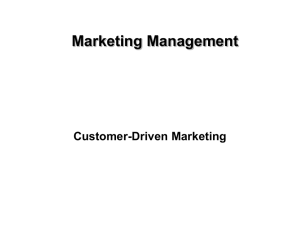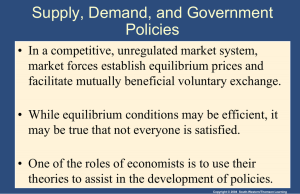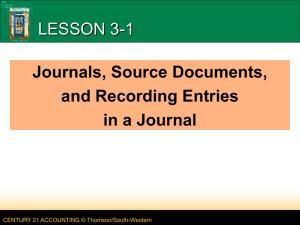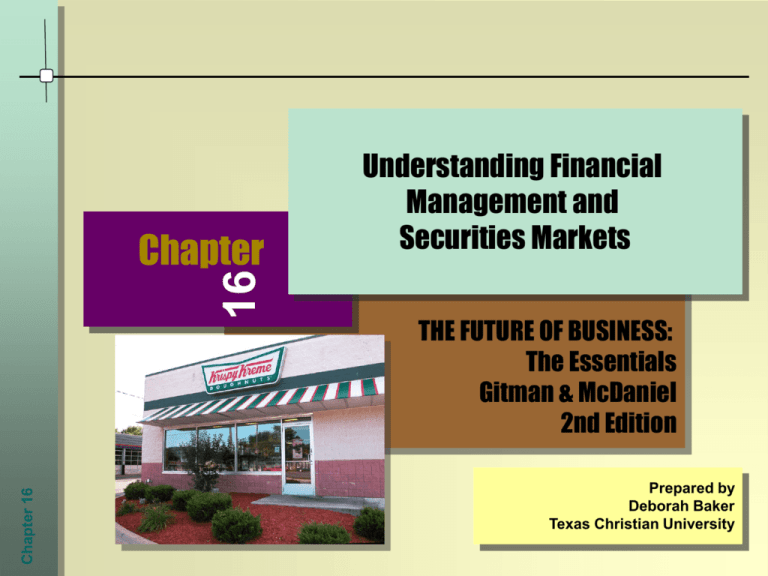
Chapter 16
16
Chapter
Understanding Financial
Management and
Securities Markets
THE FUTURE OF BUSINESS:
The Essentials
Gitman & McDaniel
2nd Edition
Prepared by
Deborah Baker
Texas Christian University
Learning Goals
1 How do finance and the financial manager affect the
firm’s overall strategy?
2 What types of short-term and long-term
expenditures does a firm make?
3 What are the main sources and costs of unsecured
and secured short-term financing?
Chapter 16
4 What are the key differences between debt and
equity, and what are the major types and features of
long-term debt?
Copyright ©2006 by South-Western, a division of Thomson Learning. All rights reserved
2
Learning Goals (continued)
5 When and how do firms issue equity, and what are
the costs?
6 How do securities markets help firms raise funding,
and what securities trade in the capital markets?
7 What are the major U.S. securities exchanges and
how are they regulated?
Chapter 16
8 What are the current trends in financial management
and the securities markets?
Copyright ©2006 by South-Western, a division of Thomson Learning. All rights reserved
3
1
How Cash Flows Through a Business
Borrowed Funds
Sale of
Fixed Assets
Owners’ investment
Collection of
Accounts Receivable
Cash Sales
Chapter 16
Purchase of
Fixed Assets
Payment of
Dividends
Payment of
Expenses
Purchase of
Inventory
Copyright ©2006 by South-Western, a division of Thomson Learning. All rights reserved
4
1
The Financial Manager’s Responsibilities
Financial Planning
Key
Activities
Investment
(spending money)
Chapter 16
Financing
(raising money)
Copyright ©2006 by South-Western, a division of Thomson Learning. All rights reserved
5
1
Risk and Return Factors
Changing Patterns of Market Demand
Interest Rates
General Economic Conditions
Market Conditions
Chapter 16
Social Issues
Copyright ©2006 by South-Western, a division of Thomson Learning. All rights reserved
6
How Organizations Use Funds
Chapter 16
2
Short-Term
Expenses
Operating expenses
Support current
selling and
production activities
Long-Term
Expenditures
Investment in longlived assets
Expansion, asset
replacement, new
product development
Copyright ©2006 by South-Western, a division of Thomson Learning. All rights reserved
7
Short-Term Expenses
2
Cash Management
Manage
Current
Assets
Accounts Receivable
Chapter 16
Inventory
Copyright ©2006 by South-Western, a division of Thomson Learning. All rights reserved
8
Cash Management
2
Surplus Cash
Marketable
Securities
Chapter 16
Treasury
Bills
Certificates
of Deposit
Copyright ©2006 by South-Western, a division of Thomson Learning. All rights reserved
Commercial
Paper
9
Cash Management
2
Collect money owed to the firm
Key
Strategies
Pay money owed to others
Chapter 16
Minimize funds tied up
in inventory
Copyright ©2006 by South-Western, a division of Thomson Learning. All rights reserved
10
Long-Term Expenditures
2
Land
Buildings
Capital
Expenditures
Machinery
Equipment
Chapter 16
Information Systems
Copyright ©2006 by South-Western, a division of Thomson Learning. All rights reserved
11
3
Obtaining Short-Term Financing
Borrow Money
(Debt)
Raising
Funds
Sell Ownership Shares
(Equity)
Chapter 16
Retain Earnings
(Profits)
Copyright ©2006 by South-Western, a division of Thomson Learning. All rights reserved
12
Unsecured Short-Term Loans
3
Chapter 16
Trade
Credit
Seller extends credit to the buyer
Bank Loans
•Lines of credit
•Revolving credit agreement
Commercial
Paper
Unsecured short-term debt issued
by a financially strong corporation
Copyright ©2006 by South-Western, a division of Thomson Learning. All rights reserved
13
Secured Short-Term Loans
Chapter 16
3
Secured
Loans
Borrower pledges specific assets
as collateral, such as
accounts receivable or inventory.
Factoring
Firm sells its accounts receivable to a
factor, such as a commercial bank
or commercial finance company.
Copyright ©2006 by South-Western, a division of Thomson Learning. All rights reserved
14
Chapter 16
4
Debt versus Equity Financing
Copyright ©2006 by South-Western, a division of Thomson Learning. All rights reserved
15
Debt Financing
4
Chapter 16
Term Loans
A business loan with a maturity of
more than one year.
Bonds
Long-term debt obligations issued
by corporations and governments.
Mortgage Loans
A long-term loan made against
real estate as collateral.
Copyright ©2006 by South-Western, a division of Thomson Learning. All rights reserved
16
5
Equity Financing
Selling Common Stock
Dividends & Retained Earnings
Preferred Stock
Chapter 16
Venture Capital
Copyright ©2006 by South-Western, a division of Thomson Learning. All rights reserved
17
Securities Markets
6
Primary
Market
Debt
Chapter 16
(a loan to the issuer)
Securities
Secondary
Market
Equity
(ownership in
issuing organization)
Copyright ©2006 by South-Western, a division of Thomson Learning. All rights reserved
18
Securities Markets
6
Investment
Bankers
Chapter 16
Stockbroker
Help companies raise
long-term financing,
a process called
underwriting
A person
(account executive)
licensed to buy
and sell securities on
behalf of clients
Copyright ©2006 by South-Western, a division of Thomson Learning. All rights reserved
19
Chapter 16
6
Moody’s and Standard & Poor’s Bond Ratings
Copyright ©2006 by South-Western, a division of Thomson Learning. All rights reserved
20
Securities Exchanges
7
Organized Stock Exchanges
Types of
Securities
Markets
Chapter 16
Over-the-Counter Market
Copyright ©2006 by South-Western, a division of Thomson Learning. All rights reserved
21
7
U.S. Stock Exchanges
New York Stock Exchanges
(NYSE)
Chapter 16
American Stock Exchange
(AMEX)
Copyright ©2006 by South-Western, a division of Thomson Learning. All rights reserved
22
7
Global Trading and Foreign Exchanges
London
NYSE
NASDAQ
Tokyo
Toronto
Buenos Aires
Frankfurt
Hong Kong
Montreal
Zurich
Chapter 16
Paris
Sydney
Taiwan
Copyright ©2006 by South-Western, a division of Thomson Learning. All rights reserved
23
7
Regulation of Securities Markets
Securities and
Exchange
Commission
The main federal government
agency responsible for
regulating the U.S. securities
industry.
Insider Trading
The use of information that is
not available to the general
public to make profits on
securities transactions.
Chapter 16
Circuit Breakers
Measures that, under certain
conditions, stop trading in the
securities markets to limit the
amount the market can drop in
one day.
Copyright ©2006 by South-Western, a division of Thomson Learning. All rights reserved
24

